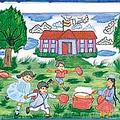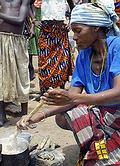 「擁有糧食的權利」是2007年世界糧食日大會的主題。聯合國農糧組織(FAO)秘書長狄伍夫(Jacques Diouf)博士在大會的演說中表示:「如果我們的地球生產足夠的糧食供應所有的人口,那為什麼依然有8億5400萬的人臨睡前是餓著肚子的?」他進一步說:「權利將不再是權利,如果我們未曾主張!」
「擁有糧食的權利」是2007年世界糧食日大會的主題。聯合國農糧組織(FAO)秘書長狄伍夫(Jacques Diouf)博士在大會的演說中表示:「如果我們的地球生產足夠的糧食供應所有的人口,那為什麼依然有8億5400萬的人臨睡前是餓著肚子的?」他進一步說:「權利將不再是權利,如果我們未曾主張!」
雖然全球生產足夠的糧食來滿足所有飢餓的人,但今日食物的供給面臨較以往更為嚴峻的壓力!主要作物如小麥和牛奶的價格不斷上漲,原因包括氣候的變遷與波動而影響收成、糧食作物轉作生質柴油,以及新世界或新興市場的需求成長。
農糧組織一直以來都與政府及非政府機關共同合作,推廣相關指導原則與架構,以協助決策者和其他人了解擁有糧食的權利。
16日在農糧組織總部羅馬所舉辦的世界糧食日中,坦尚尼亞總統基威特(Jakaya Mrisho Kikwete)指出:「世界上每天約有4萬名孩童死於營養不良或相關疾病。這些人都被剝奪了擁有糧食的權利,而他們也正是此次世界糧食日的主題。」
義大利掌管農業、糧食、森林政策的部長卡司楚(Paolo de Castro)強調「擁有糧食的權利」這個指導原則的重要性,它也是驅使政府和公民社會邁向全球糧食安全的最有效的工具。
世界糧食計劃的執行長是來自美國的希蘭(Josette Sheeran),她在世界糧食日大會中發表演說時表示:「現在,人口統計數據、氣候變遷和大宗物資的價格似乎都在跟我們作對,而排山倒海的糧食需求即將形成一個超完美的風暴,威脅著我們。但我們依然擁有希望去終結飢餓,因為科學和教育是站在我們這一邊的。」
1996年舉辦了世界糧食高峰會,11年後的今天,世界上缺乏營養的人數依然居高不下,其中有8億2000萬人在開發中國家,有另外2500萬人在轉型中的國家,甚至有900萬的人口是在工業化國家。因此,農糧組織主張「擁有糧食的權利」不單只是個道德上的要求,或者是個有豐厚經濟回饋的投資,「擁有糧食的權利」是一項基本人權。
2007年重要的活動包括:全球燭光守夜活動,10月22日起從西南太平洋開始一直擴展到全世界,希望讓世人重視全球飢荒的問題;在開羅、羅馬、巴馬科及其他城市舉辦的音樂會;體育活動,例如在羅馬和杜林舉行的「為糧食而跑」路跑賽,以及由西班牙職業足球聯盟為了提升世界糧食日的關注而舉辦的職業足球賽。
 "If our planet produces enough food to feed its entire population, why do 854 million people still go to sleep on an empty stomach?" demanded Dr. Jacques Diouf today. Speaking at the World Food Day ceremony on this year's theme The Right to Food, the UN Food and Agriculture Organization director-general said, "A right is not a right if it cannot be claimed."
"If our planet produces enough food to feed its entire population, why do 854 million people still go to sleep on an empty stomach?" demanded Dr. Jacques Diouf today. Speaking at the World Food Day ceremony on this year's theme The Right to Food, the UN Food and Agriculture Organization director-general said, "A right is not a right if it cannot be claimed."
Although enough food is produced globally to satisfy all the hungry people, food supplies are under greater pressure today than ever before. Prices of staples such as wheat and milk are rising mainly due to climate change weather fluctuations that affect harvests, the switch to biofuels, and increasing demand from new and emerging markets.
The Food and Agriculture Organization has been working with governments and nongovernmental organizations alike to promote a set of guidelines and a framework aimed at helping policymakers and others realize the right to food.
At the World Food Day ceremony held at FAO headquarters in Rome, Tanzanian President Jakaya Mrisho Kikwete said, "40,000 children die every day throughout the world due to malnutrition and related diseases. These are the people who are being denied the right to food. These are the people who are the subject of this year's World Food Day."
Paolo de Castro, Italy's minister for agricultural, food and forestry policies, underlined the importance of the right to food guidelines as the most effective means of moving governments as well as civil society towards achieving global food security.
"Demographics, climate change and commodity prices appear to be working against us right now, threatening to swirl up into a perfect storm of overwhelming need. But there is hope to end hunger, and science and education are on our side," said World Food Programme Executive Director Josette Sheeran of the United States, who also addressed the World Food Day ceremony.
Eleven years after the 1996 World Food Summit, the number of undernourished people in the world remains unacceptably high, with 820 million in developing countries, 25 million in countries in transition and nine million in industrialized countries. As a result, promoting the right to food is not just a moral imperative or even an investment with huge economic returns, it is a basic human right, the Food and Agriculture Organization insists.
Highlights of this year's events include a worldwide candlelight vigil starting October 22 in the southwest Pacific and moving around the globe to draw attention to the problem of world hunger; musical events in Cairo, Rome, Bamako and other cities; sporting events such as the Run for Food race in Rome and Turin and professional soccer games dedicated to increasing awareness of World Food Day by Spain's professional soccer league. For a list of World Food Day events, visit:
全文及圖片詳見ENS


